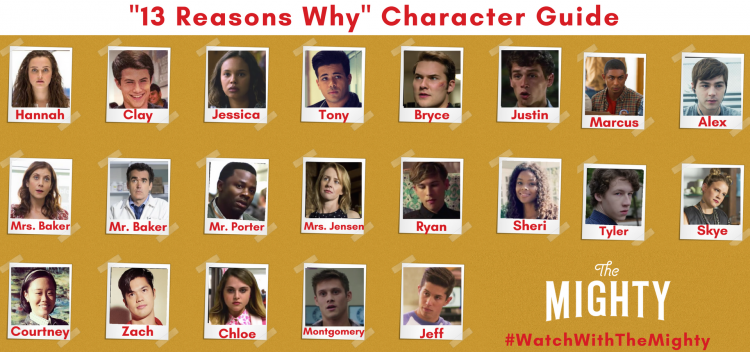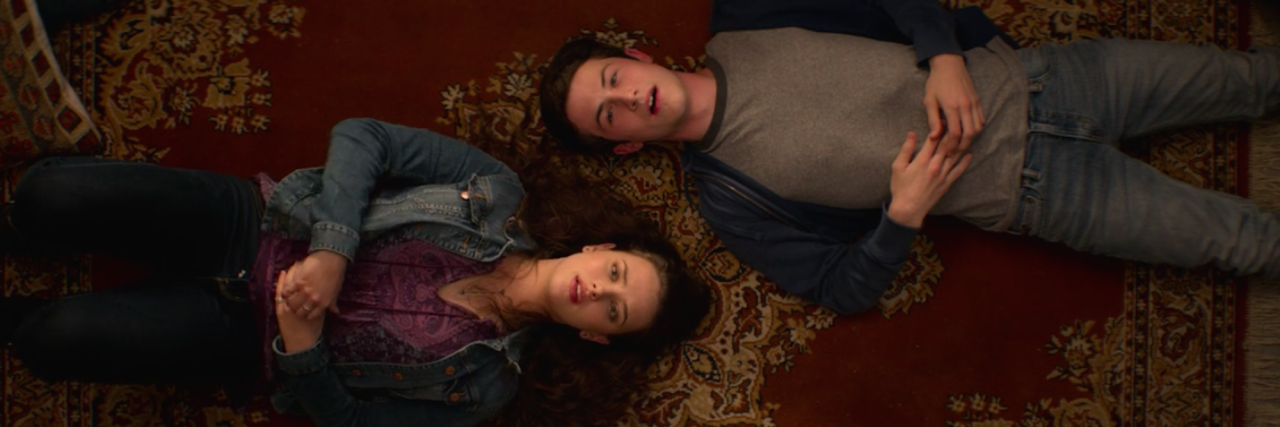'13 Reasons Why' Season 2 Episode 7 Review: 'The Third Polaroid'
Editor's Note
This post is a review of season two, episode seven of “13 Reasons Why” and contains spoilers.
Content warnings: This episode of “13 Reasons Why” references rape, suicide and illicit drug use.
Apparently, Hannah and Clay did drugs together.
If you were wondering why episode seven begins with strange, colorful psychedelic shapes and hand-drawn figures that semi-resemble Clay and Hannah, this is why.
So begins the review of another season two episode that feels altogether implausible — and really just takes you out of the narrative. Like the last episode, where we learn Hannah and Zach lost their virginity to each other, this particular plotline didn’t seem believable — largely because it doesn’t make sense that Hannah wouldn’t mention something so significant in her tapes last season.
Here’s what we know.
Before he died (and before Hannah died), fan-favorite and baseball hunk Jeff Atkins convinced Clay to do a “love drug” with him and a bunch of friends — specifically Alex, Sheri and Leah (Jeff’s supposed girlfriend who we heard nothing about last season). He says that bringing Hannah over to do the drugs with him would help Clay “loosen up” around her. Clay remarks that what Jeff is saying is peer pressure, but decides to bring Hannah and try the drugs anyway. By the way, we find out later the “love drug” Jeff was referring to was Molly, a drug that is supposed to be “pure” MDMA, the active ingredient in Ecstasy.
While high, Clay and Hannah talk a lot about “infinity,” and Hannah decides maybe we should define “infinity” by “love,” proposing that those things are essentially one in the same. I believe the writers of the show want us to see this conversation as particularly tragic because, as we know from episode five, Hannah struggled with extreme loneliness and looked to boys to fill that void. We can perhaps draw the conclusion that Hannah felt like “infinity” or “love” wasn’t really possible for her, so she took her own life.
The next day when the Molly crew “comes down” off the drug, they sit at Monet’s coffee shop and talk about the “bad moods” they are in. Sheri remarks that she knows she feels bad, but doesn’t really care. Jeff, who has done the drug before, shrugs it off and says you can’t feel the highs without the lows. Hannah, on the other hand, is visibly depressed and asks the others if they have ever thought about dying. Alex takes the question as a joke and says he thinks about it every day. Hannah has tears in her eyes and looks meaningfully at Clay, who understands it is a cry for help but doesn’t do anything. According to CNN, after the high from Molly has worn off, sometimes a user shows signs of depression and may not be able to get out of bed for an extended period of time. Hannah could have been more vulnerable to the “low” coming off the drug as she was already struggling with depression. From last season, we know Hannah is sensitive to both the “big” and “small” moments when people let her down or didn’t care enough to listen to her cry for help. There’s no way the meaningful look that passed between her and Clay would have gone unmentioned in the tapes, based on the way we know Hannah told her story in the tapes.
The story about the drugs, of course, comes out in Clay’s deposition in court. Liberty High’s litigator is ruthless in her questioning of him, and Clay, who was meant to be a slam dunk witness for the Baker defense, ends up making Hannah look worse to the jury. Clay walks away feeling like he failed Hannah again, which as we have seen over and over again, is usually the driving force behind Clay’s “vigilante” side.
At the end of the episode, we see him argue with hallucination Hannah about why she left the tapes in the first place. He suggests that she left them to teach people a lesson, to which hallucination Hannah replies, “It wasn’t revenge, I had to tell my own story.” When she said this, I was genuinely just angry. I was angry because this wasn’t really Hannah talking to Clay, this was the show writers attempting to address a common concern from last season — that Hannah’s actions were a revenge fantasy enacted via dramatic suicide. Instead of moving the plot forward in a way that acknowledged the past season’s problematic nature while looking to undo past damage, the show writers brought Hannah back via hallucination to defend themselves and the decisions they made last season.
When someone dies by suicide in real life, they don’t get to “come back” and help their loved ones get through the confusion, pain and trauma of their loss. When someone dies by suicide, their life is over, period. The tapes last season were bad enough — perpetuating the idea that someone who dies by suicide can continue to have a conversation with the living even after their death. Hallucination Hannah asserts she released the tapes because, “I wanted people to know what happened to me, so that maybe it wouldn’t happen again.”
This is such a dangerous myth to perpetuate because it can encourage people who are struggling to view their death as a “noble” way to effect change for the greater good. We cannot continue to glorify narratives that suggest suicide is a reasonable or altruistic way to get people to change. “13 Reasons Why,” you need to do better, this is dangerous messaging.
It’s also Alex’s birthday, and it seems to be a rough one. The show does not mention this specifically, but birthdays can be tough for suicide attempt survivors for a host of reasons — usually because they are a reminder that they lived when they wanted to die.
At Alex’s birthday party, Jessica unleashes hurt feelings she’s never expressed to Alex about his suicide attempt. She calls him an asshole for wanting to leave her behind, which is something many suicide loss survivors feel. It’s worth noting that these feelings are best expressed to a therapist and not necessarily to the person who was struggling because it perpetuates the harmful belief that suicide is selfish. Suicide is not the result of an individual not caring about their loved ones, it’s about wanting to end deep pain that makes life feel unlivable.
The episode ends with Clay disregarding hallucination Hannah’s wishes and uploading the recordings of Hannah’s 13 tapes online anonymously with the hashtag, #Justice4Hannah.
Stray Observations and Future Questions
- Though the episode was titled, “The Third Polaroid,” it was kind of a small plot point, considering. The third polaroid shows up on Clay’s car and shows a guy and girl having sex. The back of the photo reads, “The Clubhouse.” “The Clubhouse” has come up again and again, and will probably be the key to getting evidence to convict Bryce.
- Clay continues to call Skye throughout this episode. He still has not heard back from her.
- Alex yells at Bryce in the hallway, “Fuck you, you fucking rapist!” Bryce slows but doesn’t even turn around. Jessica gets angry with him for this outburst.
- Tyler and Cyrus blackmail Marcus with a video from “The Clubhouse” of a stripper straddling him. Tyler tells Cyrus that Zach is next because he feels slighted by Zach, who kicks him out of Tyler’s birthday party at the arcade.
- Mr. and Mrs. Baker make out by Hannah’s grave, but when they go to lunch right after, he tells her he wants to make the divorce final. Mrs. Baker appears to have hoped they would reconcile. Mr. Baker even says, “I want to close the door that I can never go back through,” in reference to Hannah, and by extension, Mrs. Baker. This scene speaks to the fact that parents process losing a child differently, and can often end up divorcing.
- Nina helps Jessica after she has a flashback of her rape at the mall in a fitting room. It’s important that the show has made a point to show that flashbacks can happen anywhere and at any time.
- We also see Bryce coerce Chloe into having sex with him. He does so forcefully, but interestingly enough, he asks her, “You’re good, yeah? You want to right?” though his actions do not truly give her the option to say no. She responds by saying, “Right,” in a defeated way. Bryce then aggressively has sex with her. This is not an example of consent because he had already begun touching her and coercing her before he asked if she was OK with it.
Our rating: 
Sorry, I’m not buying the drug storyline. Also, I cannot stand the way this show continues to glorify suicide. It’s just dangerous.
What would you rate this episode? You can vote in our Twitter poll below or in the comments section at the end of this article.
We're reviewing "13 Reasons Why" season two and what each episode means for the mental health community. On a scale of one to four stars, how would you rate episode seven? #WatchWithTheMighty
— The Mighty (@TheMightySite) May 19, 2018
You can follow along with the rest of our “13 Reasons Why” reviews here.

Want to watch “13 Reasons Why” with us? Use the hashtag #WatchWithTheMighty when you post your thoughts on social media or let us know what you think in the comments below.
Discussion Questions
- Does Bryce’s question to Chloe constitute consent? If not, what should he have done to gain affirmative, ongoing and enthusiastic consent?
- What do you think about hallucination Hannah? Does her inclusion in the season perpetuate harmful beliefs about suicide?
Header image via Netflix

